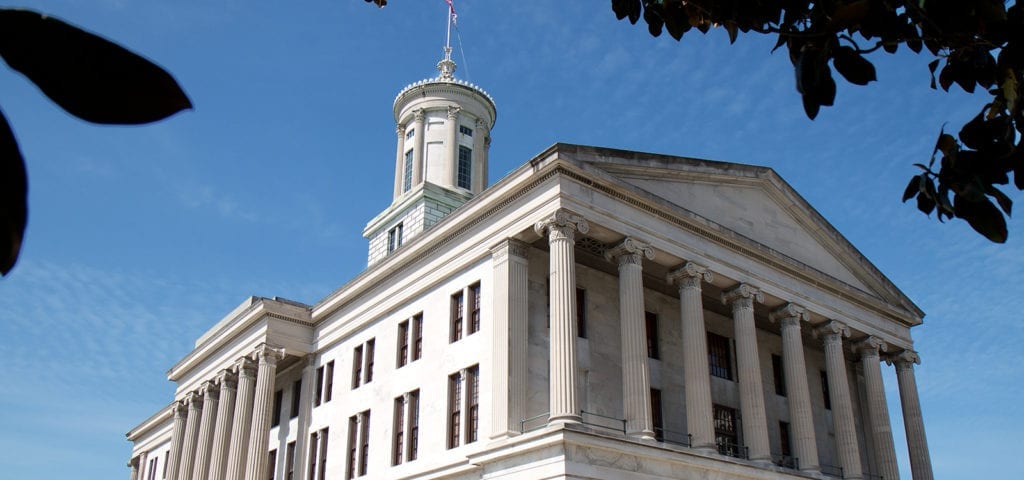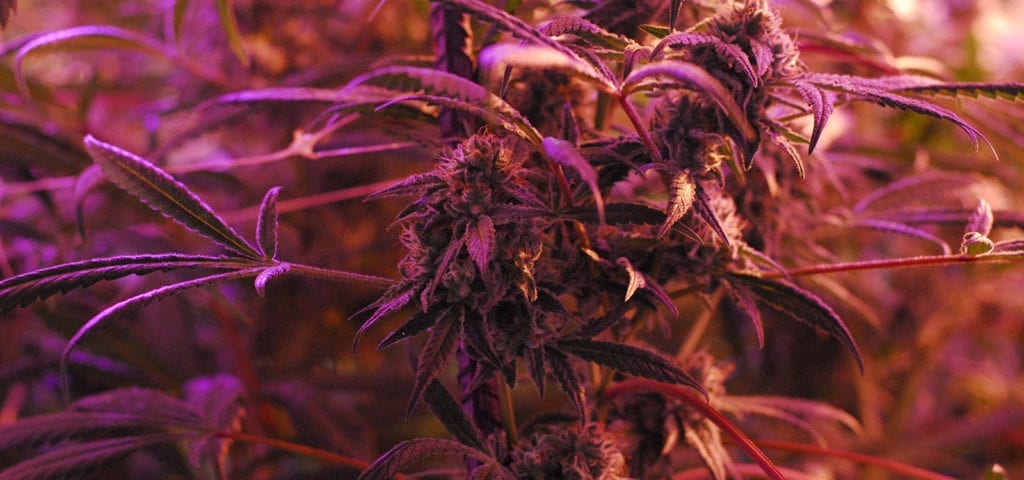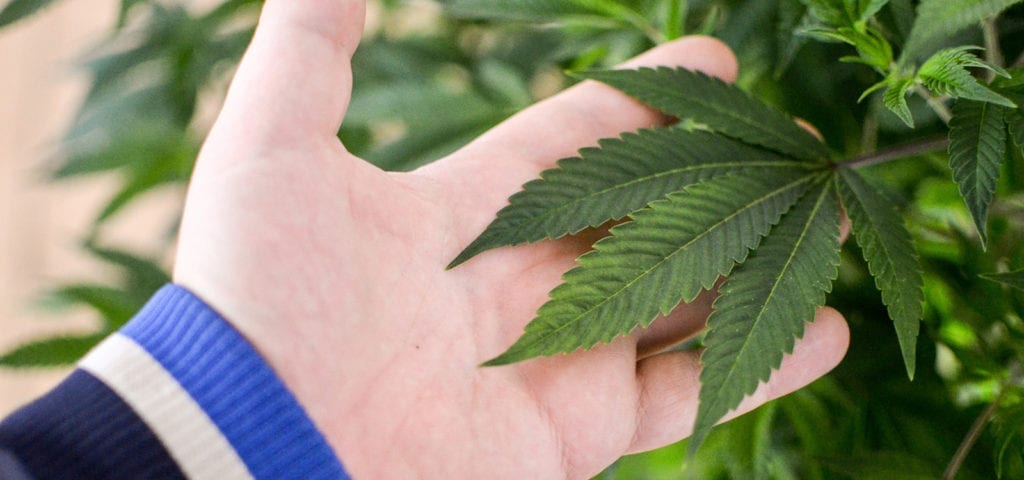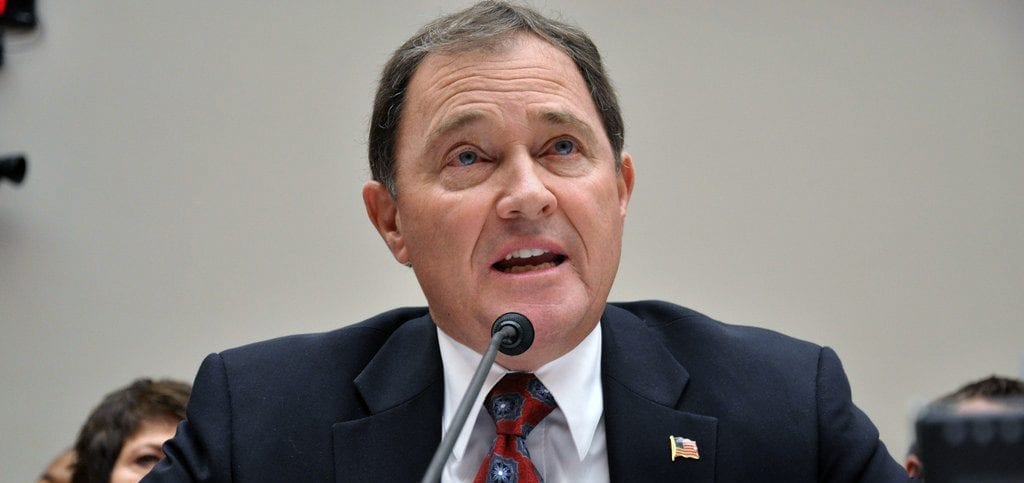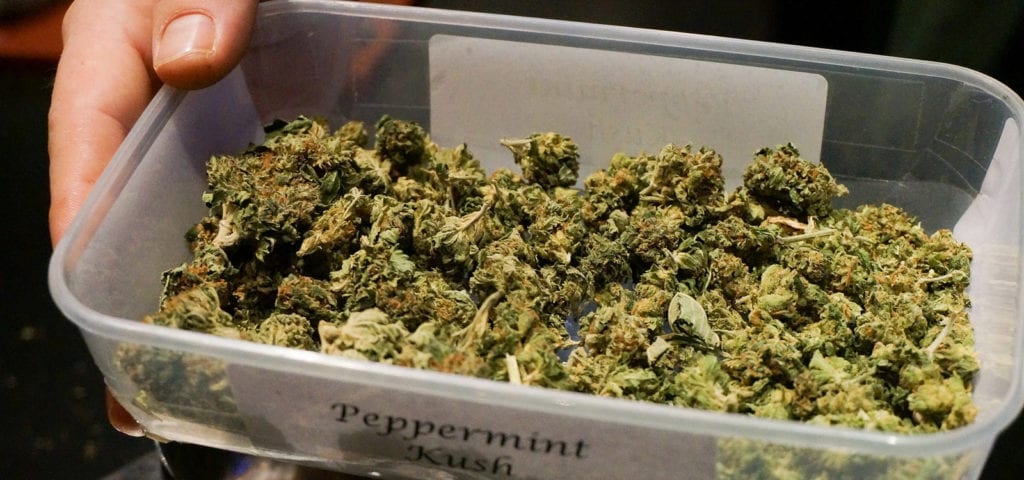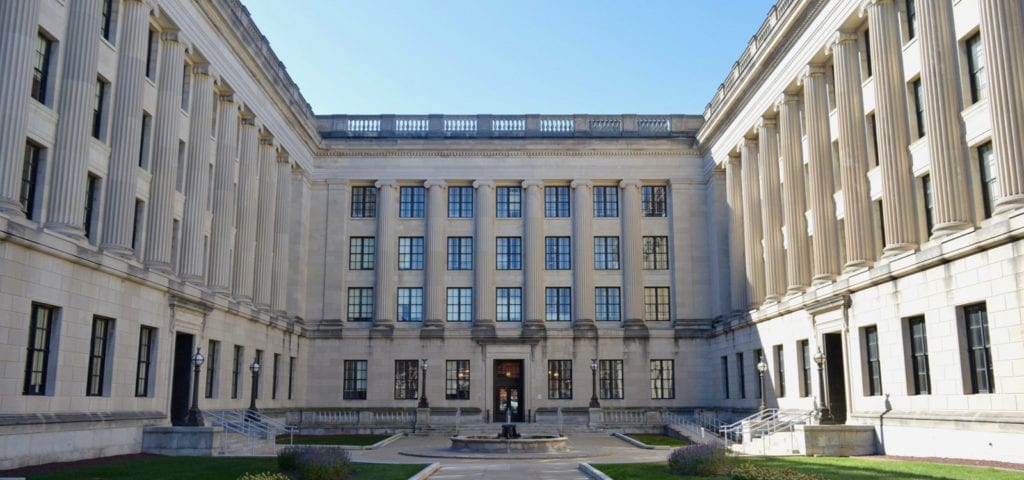Derek Cloutier is the president and co-founder of the New England Veterans Alliance, a non-profit organization that helps veterans reduce their dependency on pharmaceuticals and advocates on behalf of veterans for improved access to medical cannabis therapies.
In the following interview, Derek joins our host TG Branfalt to talk about the experience of veterans in the U.S., his own story of turning to medical cannabis as a treatment for PTSD, how the New England Veteran’s Alliance — which started as just a local group of veterans — has expanded to a community encompassing all of New England, and more!
Listen to the interview below, or scroll down read along with a full transcript of this week’s Ganjapreneur.com podcast.
Listen to the podcast:
Read the transcript:
TG Branfalt: Hey there. I’m your host TG Branfalt and you are listening to the Ganjapreneur.com podcast, where we try to bring you actionable information and normalize cannabis through the stories of ganjapreneurs, activists and industry stakeholders. Today, I’m really stoked to be joined by Derek Cloutier. He’s the President and Co-Founder of the New England Veteran’s Alliance, a veteran’s organization committed to assisting vets to improve their quality of life through more natural options in order to reduce the dependency on pharmaceuticals currently used to treat the myriad of issues that veterans face. How you doing this afternoon, Derek?
Derek Cloutier: I’m doing great. Thanks for having me.
TG Branfalt: Like I said, man, I’m stoked. I had an opportunity to meet you at the capital, get to know you a little bit, we went back and forth a few times trying to schedule this, so I’m really glad that we could finally get our lives together.
Derek Cloutier: It’s good to be here.
TG Branfalt: First, tell me about yourself, man. Tell me how you ended up in this advocacy role and about the decision to start the organization.
Derek Cloutier: Basically, I started out about 10 years ago I got back from Iraq and ended up going through getting a job. I worked at the Department of Corrections, which moving in towards the opposite side of where I am nowadays. It really wasn’t the job for me per se, or somebody with PTSD. Even just getting back I got it fairly soon and so I started having family issues, going out drinking, getting crazy, getting into fights.
I started going to the VA. I started taking all the medication that they suggested and, without question, when you’re in the military you don’t question the people that are suggesting things that are gonna improve your life or allegedly improve your life. You don’t really take into effect the side effects and other issues that come with it. I ended up drinking a lot at times and mixing SSRIs and other pills, anti-anxiety pills, and depression medication with alcohol, and ended up going down a rough road, and ended up in a 30 day rehab.
Once down there, I ended up really figuring out some things. I got home and started doing a lot of veterans outreach and talking to other guys just about what they’ve been dealing with. I actually did start another group prior that was on the same basis of what we do with the social activities and whatnot at NEVA, but it was more based around drinking, and partying, and just having a good time. It really wasn’t a wellness thing, it wasn’t really enriching anybody’s life by being out, getting drunk, and partying, and going doing pub crawls and stuff.
It led me down a road that I had issues. I started talking to a doctor and starting dealing with things like that. Then a friend suggested I try cannabis because I was having such hard times sleeping. I slept like a baby that night and ever since then it was like something that I’ve just learned more progressively from myself. I’m kind of picky on what I’m smoking or what I’m consuming, so I ended up … People noticed I had better stuff and from time to time I would just link up, and meet vets, and just give them a little of what I got, and they’d give me something what they got maybe, and we’d just make it work out.
Once it became legal in Mass. for medical, we all ended up getting our medical cards together, and we went to this one doctor, and it turned out where he was very helpful. He was actually a vet and we started bringing vets in there about five at a time or something just to talk to him about stuff and get them comfortable with it, because there was that stigma still associated with it around here that if you’re using cannabis you smell like cannabis, somebody’s gonna harass you, somebody’s gonna speak negatively about it.
We just kind of brought them to the doctor ourselves and just the doctor went through the ringer of telling them what was going on, and basically how it can help them, the different types there are, and different strains available, and just even the different ways of using it. Topicals, and either vaporizing, or combusting, or whatever it was. They just got so much more comfortable with it that they started coming out, they started not isolating themselves in their houses, and I ended up making this logo of ours, and started talking to other doctors, dispensary owners, therapists. Just people to see if they would support veterans and cannabis in general.
It was overwhelmingly suggested that we should start it. At the time, I had another friend and he was just egging it on, “We should do it. We should do it.” We actually sat on it for almost a year before rolling it out and trying to do our first event. About two years ago, yeah about two years ago, we had our first monthly meeting/get together, New England Veteran’s Alliance. We had vets from from all over New England. Up to three, four hours away from Maine, Vermont, everywhere, because it was the only thing that they could really come to.
Now, two years later we’re now progressing and having events every month in the same spot. We have people coming from as far as upstate New York, down in New Jersey, we have people coming … It’s just awesome. It was just something that there wasn’t really much advocacy for it and there wasn’t really many people talking out about it or anything, so we ended up started going to state Houses speaking about PTSD, for instance. In Rhode Island, we testified down there. We testified in Maine. We testified in New Hampshire. We testified in Vermont.
We’ve been all over the state just trying to be a voice for our veterans and just explaining to people that we can be productive members of society, and we can medicate, and still function. That stigma isn’t there that we’re just lazy, sitting around, and don’t wanna do anything. That was the main reasoning for starting it and getting it going was just to get guys out of their houses and link them to a better option that pharmaceuticals, or opiates, or anything like that. Then it just snowballed from there and we’ve had so much support. It’s been really amazing.
It’s basically through word of mouth. Veterans talking to other veterans. Now it’s a community organization that veterans help each other. You have guys throughout New England that are growing now and we just basically advocate and talk to them, consult them about how they can possibly grow for themselves, be self sustainable. They end up growing this product that’s amazing. We get help from people like Roots Organics that support us with nutrients and soil for these guys.
Once they get it going, they’re so proud of it and the result at the end they wanna share it. They wanna give it to somebody else and the best way that they’re able to do that is share it with another veteran and or consult with another vet. Be like, “Hey, this is what’s working for me, it might work for you. This is a great strain that I started out with.” It’s just been an evolution and a building process.
I was never a business person. I was an infantry guy in the Marine Corps, so it was something that I never really thought that I’d be doing, running an organization or anything like that. I think that I keep it fairly simple in a lot of aspects and I feel like being an entrepreneur, or ganjapreneur, or coming out into starting something new and where it’s evolving, now we’re looking into possible licenses for Massachusetts for co-ops to get some veteran programs going and some self-sustainable farming programs possibly. Looking for property, looking for investors, and sponsors and just going about it strategically in the way we wanna go and how we can best help veterans from now.
TG Branfalt: Sometimes, it sounds like what you do chooses you and it’s an incredible story. Congratulations on your success thus far. I wanna ask you something, I’ve heard a lot that it’s not just the consuming of the cannabis that’s helpful and you had mentioned growing. How much of the therapy do you and the people that you talk to derive from the act of actually growing the plant?
Derek Cloutier: The growing part is what, pretty much, centers us and just keeps us focused on one thing, keeping it alive. Then having an end result product that you can consume. Then it’s a full circle effect where you’re healing yourself by something that you grew and kept alive versus being a veteran, you kind of are told the opposite of that, being in war you’re around destruction, death, and all this other crazy stuff. It’s just, now, being able to, we call it, cultivation therapy. I believe in it 100%.
The veterans that we have growing as well, it keeps them busy. It gives you a reason to get up in the morning, go look at your plants, and make sure they’re doing good, check their differences. You’ve gotta feed them, you’ve gotta keep them alive, what’s working, what’s not working for them, and then just the learning process of it. It keeps the mind going, it keeps you busy. A lot of these guys, it’s a full benefit for them. It’s very therapeutic.
TG Branfalt: You said that you started, you’re in Massachusetts now, and you started in Massachusetts. Now your reach is all the way into upstate New York, which is obviously not New England. What types of events do you do and how many active chapters do you have right now?
Derek Cloutier: Right now we basically have point of contacts in all six states in New England. We’ve been as far as the west coast. We’ve been out to High Times Cannabis Cup. We spoke on the Veteran’s Panel out there in Vegas last year. We’ve done other speaking opportunities throughout New England. Our membership-wise, we started out doing a member type organization and we were going for … This is part of the learning process that we are learning as we go. We were going for a veteran’s organization specifically.
The VFWs, American Legions, they’re non-profit that are post driven organizations that have memberships and we were kind of going about it that way, but now as we’re evolving, part of the problem was that we don’t get paid for what we do and everything we do, we do on our time, and when we can. It makes it kind of hard for us, in general, to do things being a disabled vet. I felt the obligation that was a little overwhelming at times where I had to be everywhere. My financial situation with the VA and them going after benefits, had a problem.
It’s been something that we did away with the membership side where we were charging for a membership and it was a very minimal fee. That was to get your certain deals, perks, genetics. Most grow stores and places offered you significant deals and discounts. It’s something that we just got away from and stopped taking members on until we re-develop our programs. The chapter side of things, we want it to be more of a community based organization.
We haven’t really gone in the chapter direction yet, per se, but it’s evolving each state maybe possibly could have the potential to have its own farm or facility that holds events, and gatherings and get togethers. Basically, we wanna be kind of like the X games of alternative therapies, but funded by cannabis in a way that we’ve grown. We have veterans learning, getting certified, and then possibly getting them into a career down the road.
We’ve been building slowly from there and right now we’re up on Vermont. We have some folks up there looking to get going and they’re putting more events on. Some of the events that we do are comedy shows, fishing trips, boating. We’ve gone out on boats on Newport Harbor in Rhode Island. We’ve done camp outs, we’ve done beach days, we’ve done yoga, we’ve done a lot of different alternative therapies that not a lot of people would maybe think that helpful, but it’s been pretty amazing, and it’s getting veterans out of their houses, and giving them something to look forward to.
TG Branfalt: Yoga’s admittedly probably healthier for you than pub crawls.
Derek Cloutier: It definitely is. I was actually just looking up more information on yoga. We have one of our guys is a yoga instructor actually.
TG Branfalt: That’s cool. There’s a lot going on with cannabis and yoga. I don’t wanna get off topic, I wanna talk to you more about the cannabis culture for veterans, talk about some of these VA issues that you alluded to earlier, but before we do that, we’ve gotta take a break. This is Ganjapreneur.com podcast. I’m TG Branfalt.
If you are looking for a job in the rapidly growing and highly competitive cannabis industry, Ganjapreneur.com is the place to look. Visit the Ganjapreneur job board today to browse current openings with cannabis companies throughout the United States. From entry-level budtender positions to executive level career opportunities. You can also create a profile and upload your resume to be discovered by cannabis recruiters. Visit our job board at jobs.ganjapreneur.com to create your profile today.
If you are a business owner, you can post your job openings for as little as $25 on our job board to reach the largest and most engaged audience of cannabis professionals on the web. Companies who are listed in the ganjapreneur business directory are eligible for free job listings. If you’re already signed up, contact us today via the website or send us an email at grow@ganjapreneur.com to activate your unique coupon.
TG Branfalt: Hey, welcome back to the Ganjapreneur.com podcast. I’m your host TG Branfalt, here with Derek Cloutier. He’s the President and Co-Founder of NEVA, the New England Veteran’s Alliance.
Before the break, we were talking about the culture. What I wanna ask you is, anecdotally, what conditions has your organization found to be helpful for medical cannabis use? We know the PTSD, you’ve mentioned that a couple of times, but what other conditions might a non-vet consider could be used?
Derek Cloutier: PTSD is one of the primary reasons for a lot of us to be using it, but anything from chronic pain to you have people with epileptic seizures. You have people with TBI issues, traumatic brain injury, that can be helpful with that, but mostly pain, PTSD. Also, addiction issues. It’s a pretty good tool to use getting off of opiates and we’ve had a lot of success using RSO, which is Rick Simpson Oil, to get veterans off of opiates and give them either access to caregivers that have it or help them grow it so that they can produce it for themselves.
TG Branfalt: How much of a problem has that become? Opiate use among vets?
Derek Cloutier: It’s a huge problem nowadays. That’s a pill for everything. It creates issues and it creates other problems where it stems off of that and leads to other suicidal tendencies. Addiction in itself is a problem. I think veterans nowadays, like I said earlier, you come home from the military or you get out, and you go to the VA, you assume that they’re gonna give you the best possible advice that they can give you, they don’t technically really treat it per symptom. They treat it more like, “Here, try this and let’s see if this works out for you.”
I feel like that’s part of the bigger problem. If they had other therapeutic options in letting people realize who they are, get them more comfortable with themselves, and get them linked with other veterans that understand what they’re going through, they probably wouldn’t have to take these pills, they probably wouldn’t have to … You know what I mean? They would reach out to other options like, obviously, medical cannabis.
Opiates and cannabis, cannabis is proven, in my life, just from what I’ve seen from other veterans that have come off of opiates and the stories that I have heard from them, I haven’t personally had any issues with that or have any experience with it, but I only focused mostly on PTSD stuff. We have guys that they use oil every single day and it helps them every single day. They’re not using opiates, they’re not in bed wanting to die, they’re just living now versus before they couldn’t do much.
TG Branfalt: When you first start talking to older vets, maybe especially, or maybe some more conservative veterans, do you get a lot of pushback about your position and your programs?
Derek Cloutier: Push back, not really. They’re more interested and curious on how we do it and the legalities of it. A lot of people are worried about the legality of a lot of things. That’s another problem with us being an organization that’s spread out throughout New England in a way. We don’t transact over state lines, that’s illegal, and you have so many different laws in each state that are different and catered differently for each state that it makes it harder.
The older generations, the easiest way to go about it with them has been get them comfortable with topicals, get them comfortable with maybe like a capsule form. They are still stigmatized by the smell and just smoking it or anything like that. We wanna get them more on a regiment that they can be consistent with.
TG Branfalt: You had mentioned earlier that you actually got a medical cannabis card and other vets have gotten a medical cannabis card. Does getting that card automatically create any issues for you with the VA?
Derek Cloutier: With the VA? No, it has nothing to do with the VA. The VA really doesn’t … In legal states, they’re allowed to speak about it and talk about it. My doctor actually is willing to work with me in a sense that he’ll collaborate medication if I needed it that’ll work with cannabis because it’ll obviously affect me one way versus the other medication could affect you the other way. They’re very open to it.
Most of my doctors are fairly curious about it and they wanna know more and more about it. They just are very interested in learning the facts about it and how it’s helping us. People in other non-legal states have had pushback from cannabis or using cannabis, but the biggest thing right now that the VA can do, or affect, or have an effect on, is the effect that you’re taking pharmaceuticals such as pain meds like opiates, Percocets, benzos, things like that, they can actually, if you test positive for cannabinoids, then they’ll give you an ultimatum.
Well, actually, if you test positive, they don’t give you an ultimatum. You either use cannabis or you don’t, and that’s a horrible thing because a lot of guys just don’t have access to cannabis like some of us do. Sometimes they use it when they can and sometimes they don’t have it, so they do have to fall back on those other pain meds, which really sucks sometimes. We just try to link guys and get them associated with people that can get them further on finding what they need or either get them to grow for themselves.
TG Branfalt: Cannabis, medical cannabis specifically, has gained a lot of support from veteran’s associations such as the American Legion. They released a resolution, it issued a resolution, supporting medical cannabis. Has this changed the conversation in your experience now that you have these national groups, entrenched groups, supporting medical cannabis for vets?
Derek Cloutier: Makes it a little bit easier to point people in the direction of cannabis because then you can say, use for reference, “Look at, the American Legion has over 3 million veterans that they represent and they’re pro-cannabis.” It does make it a lot easier to segue into the conversation. I just wonder what they’re actually doing to educate their members, you know what I mean? Like if they’re providing them with any material or anything to suggest that they could potentially get off any pharmaceuticals and live a healthier life with cannabis? I wonder if they have a department for anything like that.
TG Branfalt: Is that a partnership you would be interested in getting?
Derek Cloutier: I would be interested in collaborating and doing anything with anybody that furthers the care of a veteran or makes their life more enriched. I put our cards at the VA and they allow us to put them there. Even my doctors, they suggest people, if they can’t talk to the doctor because the doctor doesn’t understand what they’re really going through or talking about, they suggest, “Maybe you should reach out to these guys.” My doctors do that. Other members of ours have their doctors doing that, but I don’t think it’s a consistent basis throughout the country either.
TG Branfalt: Well, you’re fortunate to be in Massachusetts. New England in general, every state’s at least decriminalized.
Derek Cloutier: Yeah, true.
TG Branfalt: I wanna talk to you a bit more about legalization and how what you’re seeing in Massachusetts has affected vets. Before we do that, we’ve gotta take a break. This is ganjapreneur.com podcast. I’m TG Branfalt.
At Ganjapreneur, we have heard from dozens of cannabis business owners who have encountered the issue of cannabias, which is when a mainstream business, whether a landlord, bank or some other provider of vital business services refuses to do business with them simply because of their association with cannabis. We have even heard stories of businesses being unable to provide health and life insurance for their employees because the insurance providers were too afraid to work with them.
We believe that this fear is totally unreasonable and that cannabis business owners deserve access to the same services and resources that other businesses are afforded, that they should be able to hire consultation to help them follow the letter of the law in their business endeavors, and that they should be able to provide employee benefits without needing to compromise on the quality of coverage they can offer. This is why we created the Ganjapreneur.com business service directory. A resource for cannabis professionals to find and connect with service providers who are cannabis friendly and who are actively seeking cannabis industry clients.
If you are considering hiring a business consultant, lawyer, accountant, web designer, or any other ancillary service for business, go to Ganjapreneur.com/businesses to browse hundreds of agencies, firms and organizations who support cannabis legalization and who want to help you grow your business. With so many options to choose from in each service category, you will be able to browse company profiles and do research on multiple companies in advance so you can find the provider who is the best fit for your particular need.
Our business service directory is intended to be useful and well-maintained resource, which is why we individually vet each listing that is submitted. If you are a business service provider who wants to work with cannabis clients, you may be a good fit for our service directory. Go to Ganjapreneur.com/businesses to create your profile and start connecting with cannabis entrepreneurs today.
TG Branfalt: Hey, welcome back to the ganjapreneur.com podcast. I’m your host TG Branfalt here with Derek Cloutier. He’s the President and Co-Founder of the New England Veteran’s Alliance. As I said before the break, you and I, we’re fortunate. We live in states, legal cannabis. You’re a little more fortunate than I do. You guys are actually gonna get an industry in the coming months. How does broad legalization affect vets? When most people think about legalization, one of the first things comes to mind is, “Oh, how much money are we gonna get in taxes?”
But they don’t think about some of these social justice issues, which I think that this is. Honestly, if we’re talking about people who should be held in some pretty high regard, at the very least, can’t access medical cannabis because the VA, because of access issues. What does legalization do for veterans?
Derek Cloutier: I think the biggest thing that it’s done so far in this area is that it’s allowed people that comfortability to come out the closet, per se, and say, “Hey, I use cannabis.” Then, first of all, they feel more comfortable talking about it and everybody doesn’t feel like they’re gonna get arrested just for mentioning the word. You can go into a smoke shop now and talk about it. It’s just normalizing it and being able to understand that you’re normal too because you smoke cannabis. You’re not crazy, and lazy, you know what I mean? That’s been the best part.
Then, obviously, the second best part would be the ease of access. Access is still an issue from time to time for some guys, but you can go right to a dispensary and grab what you need. It might be a little pricey, but it is there and that is the option that you get versus other people in their states. Then you have all these other veterans that are starting their own businesses and coming up. Normally, they’d be either isolating themselves and playing video games. I don’t know what they would do, but they are starting businesses. They see hope. They see the future. They’re moving towards these new goals in life and it’s given them purpose.
Legalization, obviously, the financial side of it where people will see money. To us, we don’t really focus on the financial side of it, but the benefit is that the money will be coming into the state, it will be providing for other programs and if somebody thinks there’s a potential for a new program that they could design that could benefit their community, maybe they could bring it up to their local legislation and easily go about it where they can say, “Hey, this money is coming in,” and they have money allotted for certain things. Maybe they can start new programs.
TG Branfalt: Maybe lots of money to the local VA.
Derek Cloutier: Yeah, I don’t know. That would be great. Or they could just give it to me and I’ll put it into veterans programs the right way.
TG Branfalt: What do you got coming up, man? You were telling me that you’ve got something coming up in May?
Derek Cloutier: Yeah. There’s a big DC rally going on Memorial Day weekend. We’re shooting for May 26th, looking at shooting for a permit. I’m filling out the applications for Lafayette Park. It’s right in front of the White House, right in between the White House and the VA. Veterans for Safe Access. It’s labeled on Facebook Veterans RALLY 2018 – Washington DC. There’s a planning group on there. You can get on there and get involved.
It’s basically we’re shooting to get some speakers and either do a march or a stand-in; however it is, a demonstration to bring attention to the fact that we have veterans killing themselves every day that are on pharmaceuticals that are taking their lives or becoming addicts and the ease of access for it would be a hell of a lot better if they legalized it or descheduled it in general. That we want to more access to it. We know the benefits of it and we say it every day, “How you gonna tell a guy with no legs that he should be on opiates versus using cannabis when he’s telling you to your face that this is happening?”
We’re looking to hopefully jump behind a bill or one of the bills that are up right now. I’m not sure what they specifically are, because I’m still learning about the federal side of it, but we’re planning a huge rally, a demonstration, in DC. We just wanna gain more support from the veterans that are in the area that wanna come out and show their support for it. I think if you can’t stand behind your veterans, who can you stand behind?
TG Branfalt: Well said. What’s your advice for veterans, or even family members of veterans, who are interested in looking into medical cannabis for PTSD or even just the cultivation therapy side of it?
Derek Cloutier: Reach out to your local organizations. There are tons of organizations out there that are focused towards cannabis education and learning more about it. You could reach out to us, we’ll try and point you in the right direction. You can go on our website, NEVAUSA.org. We’re actually redesigning that and I’ll have some educational information up there.
There are so many options out there. YouTube in general is huge for a lot of these guys, just to learn how to grow or even learning about your natural endocannabinoid system. The information is out there. People just need to take the initiative, step outside their comfort zone, and just make it work for them.
TG Branfalt: You have been very helpful to me when we first met, I had mentioned that I have a family member who’s dealing with some PTSD issues and you guys gave me the number to somebody close enough to him. It was right there. That’s just one instance of the remarkable work that you guys do, man. I really appreciate you telling your story.
Derek Cloutier: The outreach side of thing is huge. We will go to any veteran’s house. If somebody calls, we’ll pretty much get up, and make it a point to try and get there, and just talk to them, be one-on-one, and figure out something that works for them. We’re not saying that it’s gonna heal them, we’re not gonna say that it’s gonna help them 100%, but it’s what’s helped some of us and it’s how we know how to go about it. We’re subject matter experts because it’s helped us.
We’ll go to the veteran. We kind of run them through the process of how they can help themselves. We have guys with terminal brain cancer that we can help with medicine, that we have been helping. We have people that had 28 seizures a day and now they’re down to none. There’s huge medical benefits to it and it’s just really reaching out to the people in your community, talking about and I’m getting a little off subject.
TG Branfalt: Again, man, I wanna thank you so much. NEVAUSA.org is how you can find the New England Veteran’s Alliance and May 26th, Memorial Day, they’ll be doing the DC rally. Thank you so much, again, Derek for your time today.
Derek Cloutier: I really appreciate you having me.
TG Branfalt: You can find more episodes of the ganjapreneur.com podcast in the podcasts section of the ganjapreneur.com and in the Apple iTunes store. On the ganjapreneur.com website you will find the latest cannabis news and cannabis jobs updated daily along with transcripts of this podcast. You can also download the ganjapreneur.com app in iTunes and Google Play. This episode was engineered by Trim Media House. I’ve been your host, TG Branfalt.

